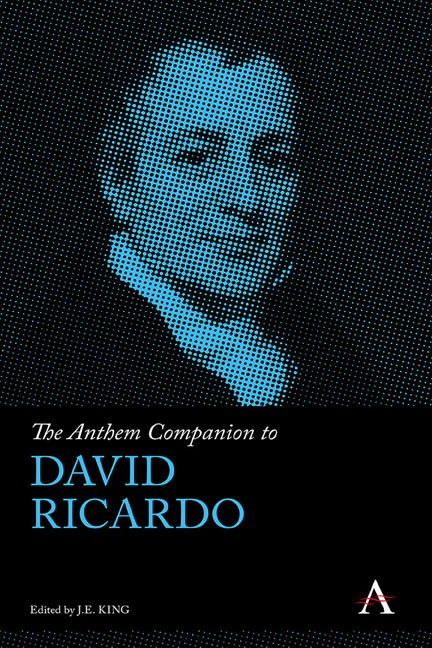Book contents
- Frontmatter
- Contents
- Notes on Contributors
- Chapter 1 Introduction
- Chapter 2 On Some Myths about Ricardo’s Theory of Money
- Chapter 3 Ricardo on Foreign Trade
- Chapter 4 ‘A Tolerably Correct Law Respecting Proportions’: Ricardo on Income Distribution
- Chapter 5 Ricardo on Economic Policy
- Chapter 6 (Mis)Interpreting Ricardo
- Chapter 7 Ricardo’s Business Activities
- Chapter 8 Political Economy ‘Through a Glass Hive’? The Encounter of Ricardian Ideas with Nineteenth-Century Australia
- Chapter 9 Ricardo and Classical Political Economy
- Chapter 10 Ricardo and Marx
- Chapter 11 Malthus and Ricardo on the Dismal Science
- Further Reading
- Index
Chapter 10 - Ricardo and Marx
Published online by Cambridge University Press: 17 October 2023
- Frontmatter
- Contents
- Notes on Contributors
- Chapter 1 Introduction
- Chapter 2 On Some Myths about Ricardo’s Theory of Money
- Chapter 3 Ricardo on Foreign Trade
- Chapter 4 ‘A Tolerably Correct Law Respecting Proportions’: Ricardo on Income Distribution
- Chapter 5 Ricardo on Economic Policy
- Chapter 6 (Mis)Interpreting Ricardo
- Chapter 7 Ricardo’s Business Activities
- Chapter 8 Political Economy ‘Through a Glass Hive’? The Encounter of Ricardian Ideas with Nineteenth-Century Australia
- Chapter 9 Ricardo and Classical Political Economy
- Chapter 10 Ricardo and Marx
- Chapter 11 Malthus and Ricardo on the Dismal Science
- Further Reading
- Index
Summary
The Place of Ricardo's Economics in Marx's Theory
Marx had great respect for Ricardo, both regarding his analytic abilities and his intellectual integrity, and Ricardo's influence on Marx's economics was greater than that of any other individual economist. Nonetheless, it is also the case that Marx was severely critical of Ricardo's propositions on value and on growth, as well as those pertaining to the coordination of economic activities under capitalist relations of production and exchange. Moreover, the most impressive parts of Marx's economics lay in areas untouched by Ricardo, and all of Ricardo's economics were interpreted within Marx's own conceptual framework, which was very different from that of Ricardo's own classical liberalism. This conceptual framework is explained in Section 2, and Marx's treatment of Ricardo's economics is elucidated in Section 3. Section 4 follows with an outline of those parts of Marx's economics which owed no debt to Ricardo and which were analytically much stronger than those which did. They are thus relevant for the overall assessment of both Marx and Ricardo as economists. Finally, in Section 5, the claims that it is possible to resurrect a so-called classical-Marxian approach to economic theorization based on the work of Piero Sraffa is assessed as it clearly relates to understanding the intellectual relationship of Ricardo and Marx (Sraffa 1960).
The Principal Influences in the Formation of Marxism
Marx's thought has often been described as combining German philosophy, French socialism and British political economy (see, e.g., Lenin 1913). The latter included the work of Ricardo, but the first two intellectual influences had the more profound effects, and these significantly affected Marx's evaluation of British political economy, including Ricardo's ideas. They determined how Marx interpreted Ricardo's economics and how he transformed some of Ricardo's propositions to suit his own purposes. Moreover, they help explain why Marx's most important contributions to economic theory occurred independently of the influence of Ricardo as they follow from Marx's historical perspective and his analysis of the mechanisms of change that are indebted to the first two influences on his thought. By contrast, Ricardo saw all of history as more or less imperfectly capitalist3 and the other British economists that Marx studied were either similarly ahistorical or, like Adam Smith, anticipated strands of the historical materialism Marx developed from his understanding of German philosophy (see Meek 1977).
- Type
- Chapter
- Information
- The Anthem Companion to David Ricardo , pp. 181 - 194Publisher: Anthem PressPrint publication year: 2023



